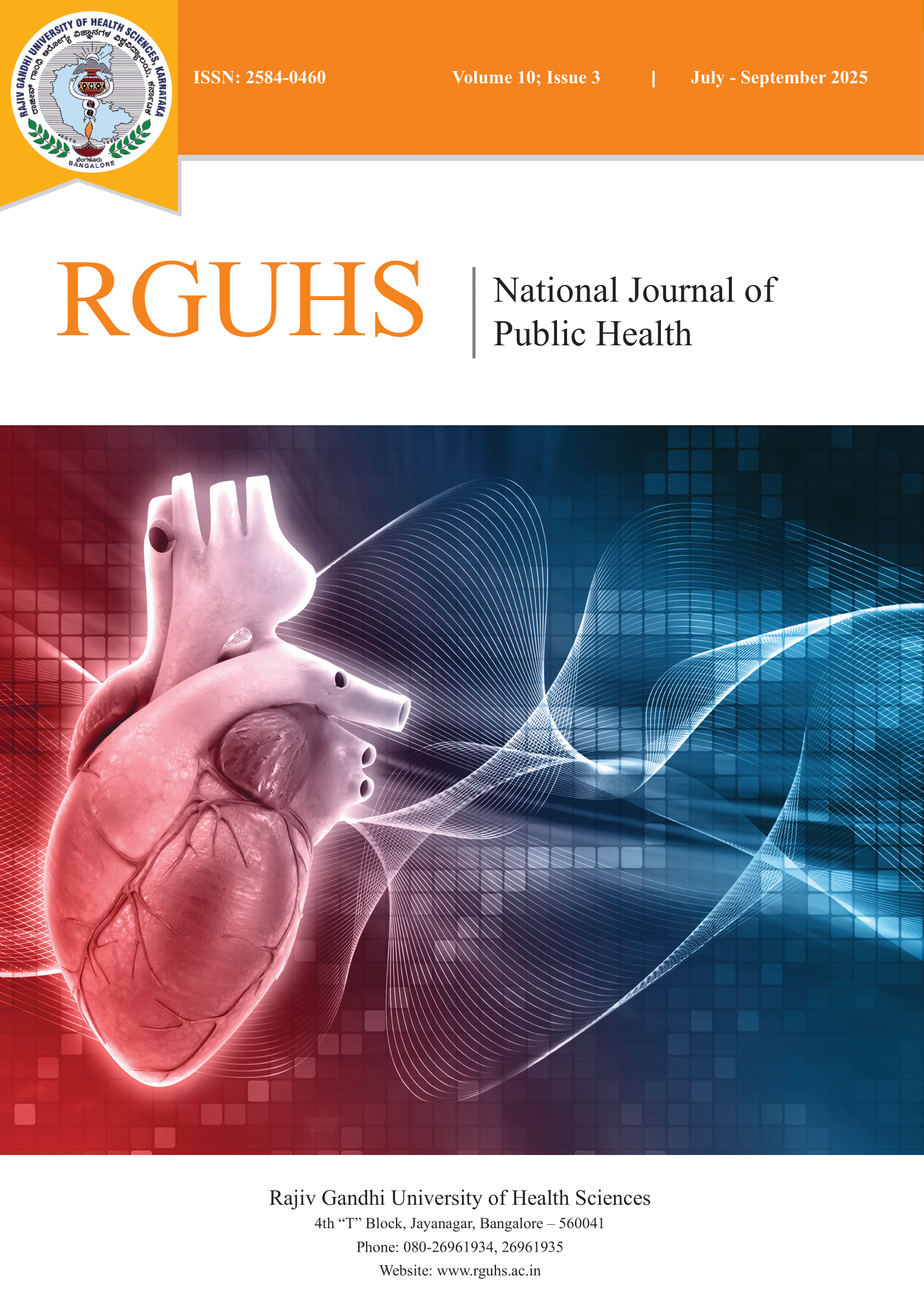
RGUHS Nat. J. Pub. Heal. Sci Vol No: 10 Issue No: 3 eISSN: 2584-0460
Dear Authors,
We invite you to watch this comprehensive video guide on the process of submitting your article online. This video will provide you with step-by-step instructions to ensure a smooth and successful submission.
Thank you for your attention and cooperation.
Ranganath T S1*, Selvi Thangaraj2 , Sahana Shree G3
1: Professor & HOD, Department of Community Medicine, Bangalore Medical College & Research Centre, Bengaluru, India. 2: Professor, Department of Community Medicine, Bangalore Medical College & Research Centre, Bengaluru, India. 3: Postgraduate, Department of Community Medicine, Bangalore Medical College & Research Centre, Bengaluru, India
*Corresponding author: Dr. Ranganath T S, Professor & Head, Department of Community Medicine, BMCRI, Bengaluru – 560002. E-mail: tsranga1969@gmail.com
Received: January 2, 2022; Accepted: February 5, 2022; Published: March 30, 2022

Abstract
Background: COVID-19 pandemic is an ongoing pandemic disease caused by SARS-COV-2 virus. In India, vaccination drive started on 10th January 2021, similarly in Karnataka, in Victoria Hospital, Bengaluru. Till date, Covishield and Covaxin are the two vaccines administered in the hospital. Recently, from 10th January 2022 precautionary dose has been introduced to the healthcare workers, frontline workers and citizens >60 years of age. Objective: To assess the COVID-19 vaccination experience among the beneficiaries visiting Victoria Hospital, Bengaluru.
Methodology: A cross-sectional study was conducted from July 2021 to December 2021, among the beneficiaries visiting Victoria Hospital, Bengaluru. The data was collected using a pre-tested, semi-structured, validated questionnaire. The data collected was entered in an Excel sheet and analyzed using SPSS 20.0.
Results: Out of 586 beneficiaries, 399 had adverse events following immunization (AEFI), higher in males (55.88%) when compared to females. Among the few AEFI, injection site pain (92.49% individuals) was more commonly reported followed by fever (28.66% of individuals). 21.5% of the beneficiaries had hypertension and diabetes as comorbidities.
Conclusion: Vaccination is the best and most effective way to prevent COVID-19 infection, serious illnesses following COVID-19 infection and further hospitalizations. Any person even those with comorbidities can be vaccinated with precaution
Keywords
Downloads
-
1FullTextPDF
Article
Introduction
As we all know COVID-19 is still an ongoing pandemic infecting majority of the people globally; the only measure to reduce the severity and hospitalization is through getting vaccinated. Vaccine acceptancy depends on individual choice and preference. So far, we have two vaccines widely used (in Government set-up) in India as well as in Bengaluru- Covishield and Covaxin, which people above 18 years are eligible to get vaccinated with. Recently from January 10, 2022 precautionary dose has been started for the healthcare workers, frontline workers and general public aged > 60 years. Initially there were 7-8 vaccination centers working for COVID-19 vaccination, out of which two are working till now. Experts assessed that about 67% of the people must be immunized against Coronavirus to stop the transmission.1 COVID-19 vaccine hesitancy is an obstacle to achieve herd immunity through mass vaccination.2 Trust in the vaccine and social trust may be important factors in individual heterogeneity, because they influence people’s decision to vaccinate, especially given that many vaccines have a reputation for poor quality, leading to a drop in vaccine coverage.3 Total 81,363 doses were given till 31st December, 2021, of which 54,040 were Covishield beneficiaries and 27,323 were Covaxin beneficiaries.
Materials and Methods
A cross-sectional study was conducted from July 2021 to December 2021 among the beneficiaries who visited Victoria Hospital for COVID-19 vaccination. The beneficiaries aged more than 18 years were considered for the study. The inclusion criteria were subjects who gave the consent for the study and those aged >18 years. Among the vaccine beneficiaries, 586 beneficiaries gave the consent for the study. The data was collected using a pre-tested, semi-structured, validated questionnaire. The data collected was entered in an Excel sheet and analyzed using SPSS 20.0.
Tools
The questionnaire consisted of socio-demographic details, any comorbidities or any significant medical/ surgical history, perception towards COVID-19 vaccination, adverse events following immunization (injection site pain, injection site soreness, fever, fatigue, headache, cold, body ache, vertigo, drowsiness, vomiting, others), individuals without adverse events.
Results
Out of 586, 368 (62.8%) were males, 218 (37.2%) were females. 172 (29.35%) belonged to 18-44 year age group, 248 (42.32%) belonged to 45-60 year age group and remaining 166 (28.32%) were above 60 years. Among 399 beneficiaries who had AEFI, 223 (55.88%) were males, 176 (44.11%) were females. Hypertension, diabetes, heart diseases, asthma, allergic history were the few comorbidities seen in this study (Table 1, figure 1). The most frequently reported adverse events were injection site pain, fever, headache, fatigue and injection site swelling (Table 2, figure 2). Adverse events usually appeared after 12 hours and subsided within 48 hours of vaccination.
Conclusion
COVID vaccines are intended to provide immunity against COVID-19 infection, reduce the severity and thus hospitalizations. Adverse events following vaccinations are mild, non-serious and are temporary. Vaccination is the best measure to control the spread of the pandemic. COVID vaccines have good safety profile among the population. The individuals with comorbidities should be vaccinated with some precautions with observatory period.
Supporting File
References
1. Salje H, Kiem TC, Lefrancq N, Courtejoie N, Bosetti P, Paireau J et al. Estimating the burden of SARS-CoV-2 in France. Science 2020; 369(6500): 208–211.
2. Abedin M, Islam MA, Rahman FN, Reza HM, Hossain MZ, Hossain MA, et al. Willingness to vaccinate against COVID-19 among Bangladeshi adults: understanding the strategies to optimize vaccination coverage. PLoS One 2021;16(4): e0250495.
3. Leng A, Maitland E, Wang S, Nicholas S, Liu R, Wang J. Individual preferences for COVID-19 vaccination in China. Vaccine 2021;39(2):247-254.

